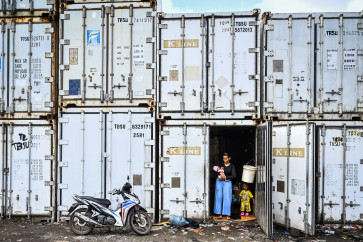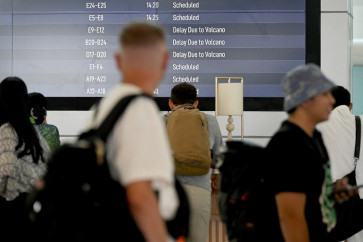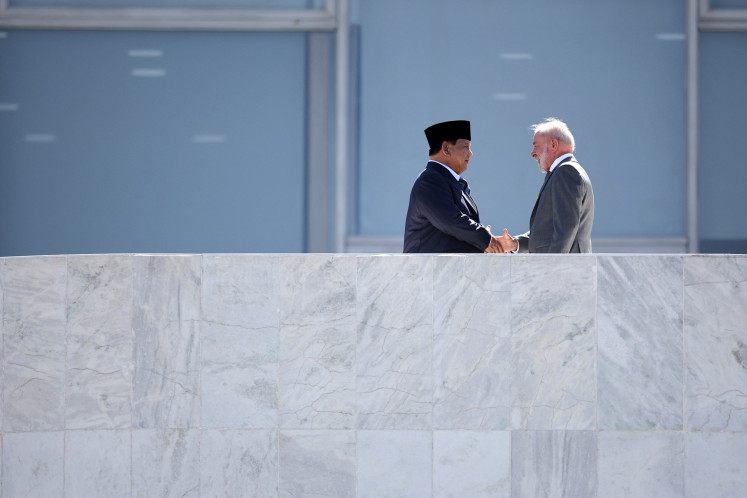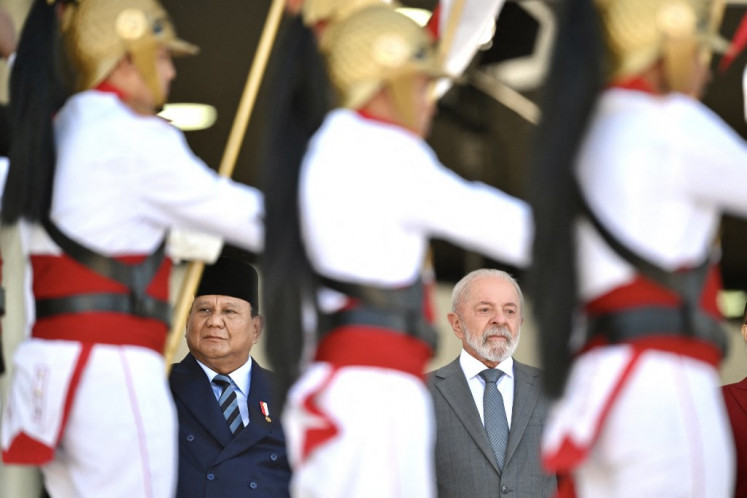Popular Reads
Top Results
Can't find what you're looking for?
View all search resultsPopular Reads
Top Results
Can't find what you're looking for?
View all search resultsLeftist thinking finds outlet in social media
Indonesiaâs leftist school of thought, which experienced a long exile throughout the New Order regime, has been reignited with new-found energy thanks to the Internet and, in particular, social media platforms such as Facebook and Twitter
Change text size
Gift Premium Articles
to Anyone
Indonesia's leftist school of thought, which experienced a long exile throughout the New Order regime, has been reignited with new-found energy thanks to the Internet and, in particular, social media platforms such as Facebook and Twitter.
A number of online publications are featuring articles with leftist perspectives discussing various issues, from God to gender, wealth to history and environment to literature.
The most prominent among the few is Indoprogress, which is also published in printed form. Founder and editor Coen Husain Pontoh told The Jakarta Post that the journal had found an affordable mode of distribution via the Internet.
'The Internet and the social media have presented distribution opportunity for leftist thinking in Indonesia, especially on account of its affordability,' Coen said recently.
Indoprogress.com is not only home to the online journal but also provides links to other pages such as theory page Logika and Left Book Review.
Ted Sprague, the editor of militanindonesia.org, another leftist publication, also finds the Internet and social media to be a facilitator in spreading the leftist school of thought.
Tapping a niche audience, the Twitter account of Indoprogress (@indoprogress), for example, has more than 4,000 followers, while Militan Indonesia's Facebook group has over than 8,000 members.
Militan's website itself welcomed about 60,000 visitors per year, Sprague said. The numbers might not be significant but having Internet presence has lent some leverage to the leftist publications, allowing them to show the public that the leftist school of thought is alive and well, at least judging from the growing body of leftist writers contributing to the respective publications.
'The good news is, Indoprogress' writers are mostly young people from various educational, social and political backgrounds.
'What's more important is they are very bright and open to every development in science,' Coen, who resides in New York City, told the Post in an email interview.
While the Internet lends leftist thinks and activists a public presence, the situation in the offline world is actually even more promising.
Eko Prasetyo, an editor at publishing house Resist Book, said that book sales through its Facebook page had amounted to about Rp 1 million (US$87.41) to Rp 2 million a month ' only a fraction of what Resist Book sold through offline events in various cities.
Resist Book, which does not sell books at major bookstores, relies on word-of-mouth and networks of university students as well as its Facebook page.
Sprague said that although the advent of the Internet had an important role in the spreading of leftist thought, 'but it is the objective situation that creates the fertile ground for such ideas to grow. This objective situation is the blatant failure of the current socioeconomic system ' capitalism ' to bring forward thesociety as a whole.'
Sprague, an Indonesian activist and an administrator at Marxists Internet Archive Bahasa Indonesia (marxists.org), said young people now only saw unemployment, the precarious job situation as well as the widening gap between the rich and poor. 'These are the conditions that push many people toward socialist ideas.'
Martin Suryajaya, an author of several leftist books like Alain Badiou dan Masa Depan Marxisme (Alain Badiou and Marxism's Future) and the writer of Indoprogress' Logika page, said that social media had a positive impact on leftist thinking.
The presence of leftist perspectives on Twitter and Facebook has debunked the perception that 'the left' is something to be scared of.
'Leftist thinking has started to be accepted as a perspective that is open to debate,' Martin said.
Martin himself, however, does not maintain his Twitter account @martinsuryajaya.
'Ever since I made the account, I have never used it because I don't really have anything to tweet. Besides the character limitation is to short, I don't have the patience to read [others'] 'kultwit',' he said. Kultwit is a colloquial term for a series of tweets.
He does have a Facebook account, through which he promotes his book and speaking events.
Coen, Sprague and Martin shared a similar view on the return of leftist thinking in Indonesians' daily life.
'I think the leftist school of thought is important and still relevant,' Martin said.
He said that in academia it was important because Marxism offered a scientifically rigorous approach to social problems and provided an important critique of the current development model and an alternative way to see economic reality in general.
Coen said decades of leftist perspective absence in academia had resulted in the inability to have a clear analysis of conflicts in society.
The dissatisfaction that is actually caused by poverty, ignorance and the social gap as a result of capitalism has been expressed through horizontal conflicts between different religious groups, for example.
'The structural-vertical conflicts have become cultural-horizontal merely because of the inability to analyze the fundamental causes of the conflicts. As a result, instead of problem solving, [the lack of accurate perspective] has bred new, more complicated problems,' Coen said.
For Sprague, the future of leftist thinking and the left movement in Indonesia is bright.
'The objective situation is very ripe for the revival of the left movement in Indonesia. Militan Indonesia, and many other left organizations, seek to educate workers, to build a genuine mass political movement with workers who are politically conscious. The age-old politics of 'floating masses' has to be dismantled, and is being dismantled as we speak,' he said.










